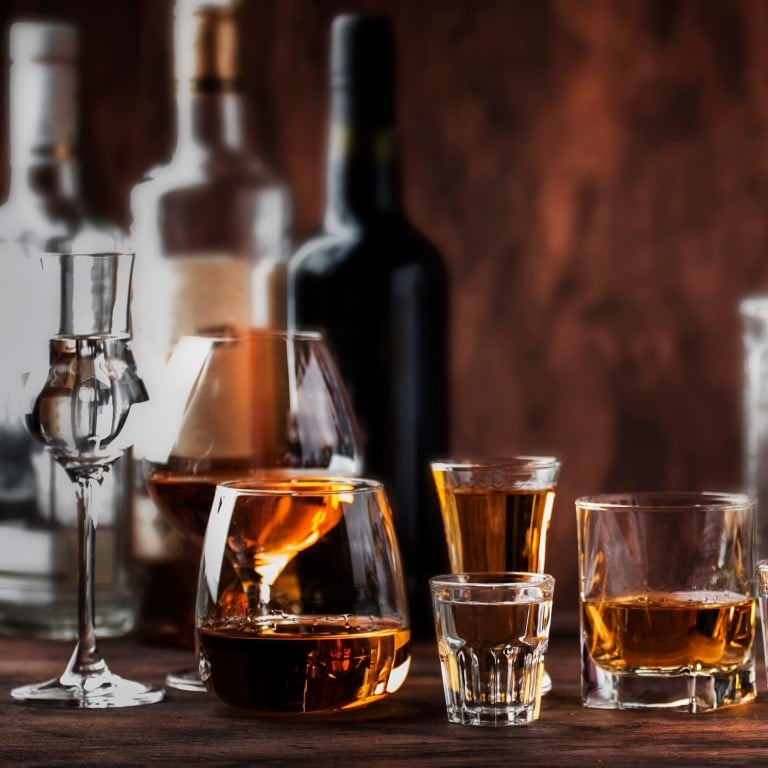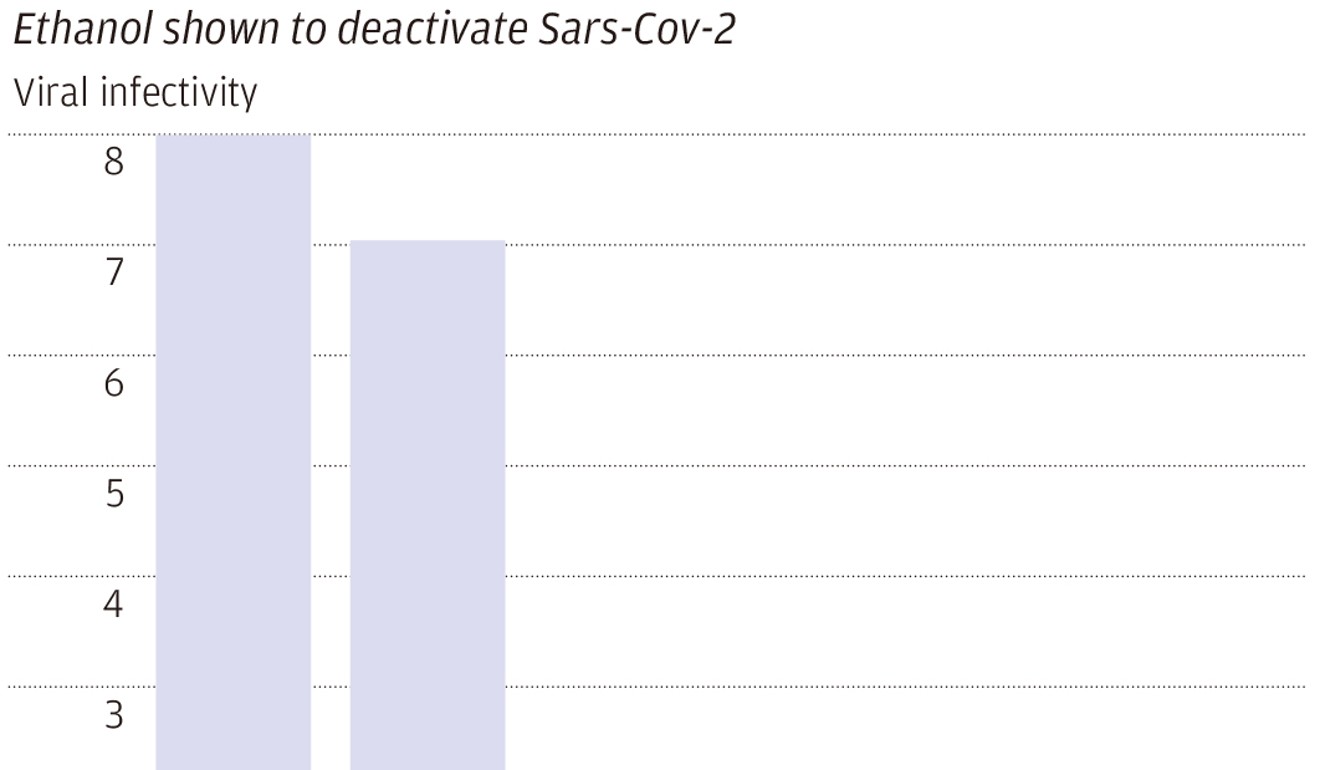
Why whisky could kill the coronavirus (but drinking it won’t work)
- The virus that causes Covid-19 appears more vulnerable than Sars, which means a 40 per cent solution, typically found in alcoholic spirits, can be enough to destroy it
- Researchers stress that downing shots is not recommended but strong liquor could be used as an emergency sanitiser
The new coronavirus is more sensitive to alcohol than Sars or Mers and can be killed almost completely by ethanol concentrations as low as 30 per cent, according to a joint study by scientists from Germany and Switzerland.
Though many spirits such as whisky or gin have an alcohol content higher than that, scientists do not recommend using them as a disinfectant unless in desperate situations and they stressed that people should not regard drinking as a way to prevent or cure Covid-19.
Stephanie Pfaender, the lead scientist of the study, said on Wednesday that their experiment was conducted in a laboratory setting, therefore “one cannot directly translate these findings towards personal use upon application of whiskey, rum etc”.
She continued: “We would definitely not recommend the behaviour (of drinking), as we are talking about a minimal final alcohol concentration that has to come into contact with the virus for a defined time.”
China developing 9 potential vaccines in global race for coronavirus cure
Pfaender, from the department for molecular and medical virology in the Ruhr-University Bochum, and her collaborators used a viral strain from a patient in Munich and then infected animal cells with it. These cells were then placed in alcohol solutions of various strengths.
They first tried a solution of 85 per cent ethanol with water, a formula recommended by the World Health Organisation for making hand rubs at home when commercial products are not available.
The WHO formula was not based on evidence, however, but the assumption that the alcohol would have a harmful effect on the coronavirus that causes Covid-19 in the same way it does for other viruses and bacteria.
The European team found the formula could eliminate viral activities after 30 seconds of contact and an examination of the treated cells showed no more damage caused by the virus.
They then repeated the tests at lower concentrate rates. At 10 and 20 per cent, most of the viral strains (80 and 70 per cent respectively) remained intact.
But as the alcohol content reached 30 per cent they were surprised to find a disinfection rate on a par with the WHO formula.
The researchers said the new coronavirus appears more vulnerable to alcohol than two other deadly coronaviruses – severe acute respiratory syndrome (Sars) and Middle East respiratory syndrome (Mers).
Pfaender has conducted similar experiments with Mers and Sars strains before and found they could withstand ethanol concentrations of more than 35 per cent.
The researchers released the results of their experiment on biorxiv.org last week. Their paper, though not peer-reviewed, had received professional checking to ensure it followed basic research guidelines and contained no information that may harm public health.

The exact working mechanism of alcohol on the new coronavirus requires further investigation, but a possible explanation may be found in the its structure, according to Pfaender.
The coronavirus, which is known as SARS-Cov-2, has a similar structure to other coronaviruses with a spiky membrane around its core.
This membrane not only protects the core but allows the virus to bind with human cells. However alcohol can initiate a chemical reaction with biological materials, such as fatty acids, on the membrane.
Although this does not destroy its genes as effectively as other disinfectant methods such as heat and ultraviolet radiation, it can cause the protective envelope to disintegrate and remove its capacity to infect and replicate.
Li Zhong, a professor at the school of public health in Nanjing Medical University, said the study suggested strong liquor could be used as an disinfectant in emergencies when other products were not available.
Many brands of whisky contain more than 40 per cent ethanol while other drinks such as vodka can have an even higher concentration.
Though not up to medical standards, spirits can still incapacitate the coronavirus on hands, doorknobs or in the air, Li said.
But he said a whisky hand rub may not be any more effective than washing your hands with soap and water, adding “physical removal can be safer and much cheaper”.
Coronavirus: from vaccines to getting back to work, China turns to science
Li also said there were numerous studies showing drinking alcoholic beverages did not help to suppress viral infections, and the chances that it would work for Covid-19 patients were extremely slim.
Some recent studies have suggested that many infections start in the lower part of the lungs, rather than the throat, and Li said “unless you can put the drink in the lungs, there is no way it can kill the virus”.
Some studies have also suggested that one of the harmful effects of alcohol abuse is that it can damage the immune system by reducing the number of T-cells that play a key role in the immune response system and harming the liver.
A study by Japanese scientist Takaaki Nakaya published in the journal Scientific Reports in 2017 discovered that the interaction between alcohol and viruses in human body could be more sophisticated than in a test tube, which reduces its effectiveness as a disinfectant.
Nakaya dripped ethanol on flu viruses mixed with human mucus and observed that the disinfection rate dropped significantly as the thickness of the mucus increased.
This suggested the mucus may have served as a buffer preventing the alcohol from reaching the virus, according to the researchers.
Purchase the China AI Report 2020 brought to you by SCMP Research and enjoy a 20% discount (original price US$400). This 60-page all new intelligence report gives you first-hand insights and analysis into the latest industry developments and intelligence about China AI. Get exclusive access to our webinars for continuous learning, and interact with China AI executives in live Q&A. Offer valid until 31 March 2020.

